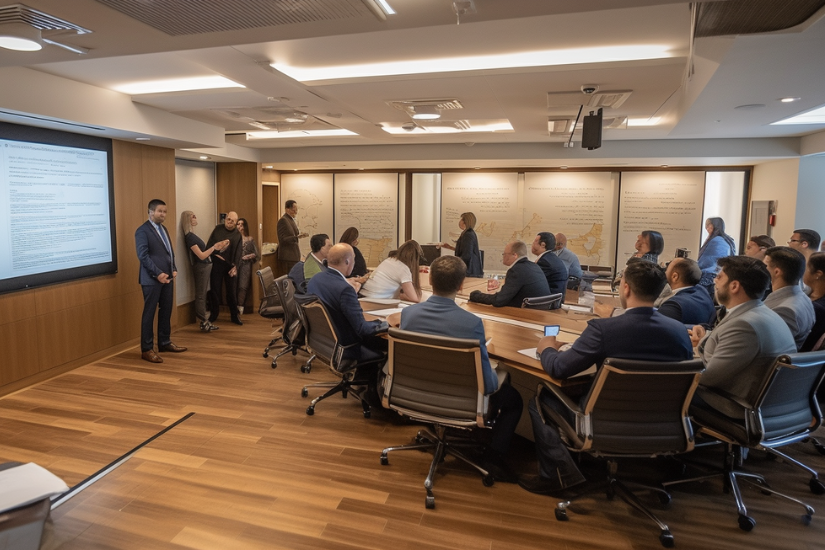Reactive Executive can provide you with an interim manager in less than 48 hours.
Find your manager
What is leadership: definitions and characteristics
Sommaire
Leadership is a fundamental notion that transcends the boundaries of the professional and personal world. In the context of modern business, leadership has become an essential skill for those who aspire to excel in their roles as managers, leaders, executives or interim managers . But what is leadership?
Definition of leadership
Leadership is the ability to inspire , guide and influence teams towards the accomplishment of common goals. This concept goes well beyond simple hierarchical authority and is based on interpersonal skills, values, and a commitment to collective success. Leadership also extends into daily life and can be expressed within family, friends, or within the community.
The 5 types of leadership

There are many types of leadership , each with their own strengths and weaknesses. The main types of leadership include:
- Authoritarian leadership : Authoritarian leadership is characterized by strong authority and centralized decision-making. The leader exercises strict control over his team, making unilateral decisions. While this can be effective in emergency situations, it can sometimes lead to low motivation.
- Transformational Leadership : Transformational leadership focuses on motivating and inspiring team members. Transformational leaders drive strong engagement by articulating a clear vision, encouraging innovation, and creating a positive work environment.
- Transactional leadership : transactional leadership is based on clear exchanges between the leader and employees. Rewards and sanctions are used to motivate and guide team behavior. This type of leadership focuses on performance management and accountability.
- Situational leadership : this style aims to adjust leadership according to the situation and the individual. Leaders can adopt authoritarian leadership when the situation requires rapid decision-making, or delegative leadership when the team is able to manage its responsibilities autonomously.
- Participative leadership : This style encourages employees to take part in decisions and provide ideas. The leader relies on the ideas and contributions of others to make decisions. This style can be effective in motivating and engaging team members, but it can also be slower and less effective than authoritarian leadership in situations where there is a need to act quickly.
What are the characteristics of a leader?
An effective leader has a diverse set of characteristics and skills that enable them to guide, influence and inspire their team. These traits are often divided into two essential categories: soft skills and technical skills.
The 8 soft skills of a leader

- Visionary : a leader has a clear vision of the future and knows how to communicate it in an inspiring way to his team. He guides his team towards a common goal by establishing a path to follow.
- Inspiring : A leader excels in the art of inspiration. He motivates employees to give the best of themselves by sharing his enthusiasm and passion for work.
- Empathetic : Empathy is a valuable quality for understanding the needs and concerns of your team. An empathetic leader creates an environment where everyone feels heard and understood.
- Decisive : The ability to make informed decisions is crucial for a leader. He knows how to weigh options quickly and make difficult choices when necessary.
- Self-confidence : Self-confidence is the foundation of a leader’s credibility. It allows you to guide your team with confidence, even in moments of uncertainty.
- Charisma : Charisma attracts and creates an aura of natural leadership. It allows the leader to bring his team together around his vision.
- Emotional intelligence : a leader gifted in this area understands and manages their emotions as well as those of others. This promotes positive relationships and healthy team dynamics.
- Integrity : Integrity is essential to building trust. A leader of integrity acts with honesty, ethics and respect for moral values.
The technical skills of a leader
- Ability to Communicate : A leader knows how to effectively convey information, ideas, and directions to their team. Clear communication is essential to avoid misunderstandings.
- Ability to make decisions : decisions must be made quickly and with discernment. A leader knows how to assess situations, weigh options and choose the best path forward.
- Ability to resolve conflicts : Conflicts can arise in any team. A competent leader can manage them constructively, seeking solutions that benefit everyone.
- Ability to delegate : a leader cannot do everything alone. He knows how to delegate tasks and responsibilities in a balanced manner, trusting his colleagues.
What are the different ways to develop your leadership?
Leadership is important in any business. It helps give the company a clear direction and a long-term vision . It also helps create better relationships between employees, while providing them with practical skills and knowledge, which helps increase efficiency and productivity. Here are 5 specific activities you can do to develop your leadership skills :
- Read books and articles on leadership,
- Attend leadership conferences and workshops,
- Train yourself in the notions of leadership with the help of an interim management firm,
- Adopt a leadership role in your personal or professional life,
- Look for volunteer opportunities in your community.
The importance of leadership in transition management
Interim management is a phase where the company goes through significant changes, whether it is a restructuring, a merger, an acquisition or a period of crisis. In such situations, the importance of leadership becomes particularly paramount. At Reactive Executive, interim managers:
- Are real agents of change,
- Implement resistance management and effective communication,
- Know how to be flexible by adapting to all situations.
Reactive Executive is committed to providing skilled transition leaders who can guide businesses through the turbulence of change .










